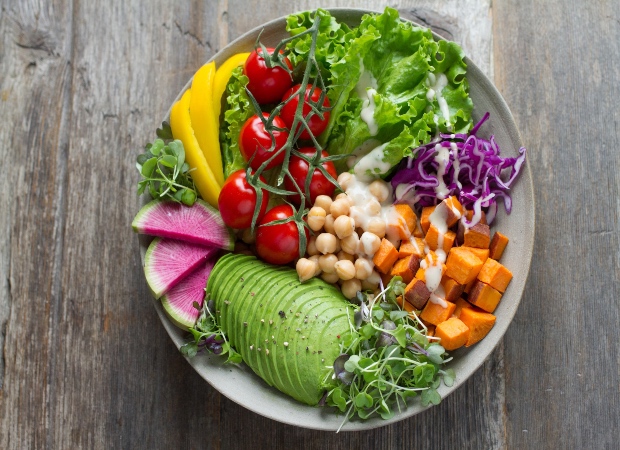So, you want to change your food choices to better align with the needs of our planet, but aren’t keen to go fully plant-based? A few tweaks can go a long way towards a climate-friendlier lifestyle.
In this article, we’ll look at:
- the meaning of sustainable eating;
- the impact of meat on our climate;
- a few things you can do to cut down on your animal protein intake.
So, what is “sustainable” eating?
Simply put, sustainability means creating and maintaining conditions that will preserve people and nature’s wellbeing for present and future generations.
In the food landscape, overwhelming evidence suggests that livestock and fish farming devastate the environment’s ability to regenerate and maintain balance. So the less of these we eat, the better it is for the planet.
The definition of sustainability is as true for the planet as it is for own bodies.
No matter how good your food looks, tastes or makes you feel – if how you eat now harms your future, you’re not eating well.
However, eating sustainably is highly complex and influenced by many factors. If we want to restore our relationship with the environment, reducing our intake of animal protein is key to responsible eating.
The impact of eating meat on our climate
The continued mass farming of animals to meet the growing global demand for meat has dire consequences for our environment.
According to the UN Food and Agriculture Organisation (FAO), livestock farming alone is responsible for 14–18% of greenhouse gas emissions (other studies suggest that this number is much higher). Beyond that, it uses up a third of global freshwater supplies and 26–29% of the Earth’s ice-free land – land that could be reforested.
Considering that 90% of all Amazon destruction is caused by livestock farming, and that we need these rainforests to draw down carbon and reduce rising temperatures, it becomes increasingly evident that eating meat and other animal products at this rate is wildly irresponsible and will be bad news for future generations.
5 things to do to reduce your animal protein intake
Let’s explore some animal protein alternatives with specific comparison to greenhouse gas emissions.
1.Less fauna, more flora
Lentils, beans or soy mince are great-tasting, climate-friendly alternatives for dishes such as Bolognese or lasagne. The production of 100g of mince emits between 9 and 105 kg of CO2 (on average 25kg). In comparison, 100g of beans is responsible for just 0.65kg of average CO2 emissions – that’s almost 40 times less.
2. Opt for the true cream of the crop
Leave out the cow’s milk, cheese and butter. Instead, opt for plant oils, grains, legumes or nuts as thickeners and creamers. Milk production is responsible for 3.15 kg CO2 per kg of product, and cheese 23.88 kg, whereas most nuts only contribute 0.43 kg CO2 per kg with other plant alternatives falling below 2kg CO2per kg.
- Olive oil mixed with chopped herbs, then chilled, is a wonderful butter replacement on toast or for cooking.
- Soaked cashews or cannellini beans make tasty, nutritious creamers in smoothies and soups.
3.Become seafood savvy
A third of global annual fish catch is fed to livestock, and 75% of fish stocks are depleted, overexploited or exploited.
- If you’re craving sushi, try plushi – a plant-based alternative.
- Ditch the salmon and try a delicious alternative such as Herbi Raw Salmun, which is made from carrot strips!
- If you must eat fish, support local small-scale fisheries through apps such as Abalobi.
4.Go easy on the eggs
Eggs aren’t innocent in the climate impact space, sitting in the middle of the chart at 4.67 kg of CO2 per kg. In comparison, tofu for human consumption contributes an average of 1.6 kg of CO2. Sadly, more than 96% of soy grown is used as animal feed or cooking oil.
Occasionally substituting eggs with these alternatives can lighten this load:
- Soft tofu bought from your local Asian grocer is a delicious alternative for scrambled eggs when cooked with turmeric, paprika and seasoning.
- When baking, swap an egg for 1 T soaked, omega-rich chia seeds as a plant-based binder.
5.Embrace local diversity
The bulk of the world’s food comes from just 12 plants! That’s wild. By frequenting community veggie gardens and co-ops, you’ll be exposed to the seasonal variety available. Your food will be grown closer to home, spend less time in cold storage, and will more likely come from farms that practice crop rotation – all factors that contribute to reduced emissions.
Ultimately, your goal shouldn’t be to find the unicorn diet for pure sustainable eating. It should be making responsible food choices to be as climate-friendly as possible.
The real transformation begins when we realise that a lifestyle of reduction adds more to our lives, not less. If many people reduce, eating less becomes a world of plenty for all.
For tips and support on eating less meat, head to Oceaneers – an organisation who aim to make your reduction journey rewarding and fun.

